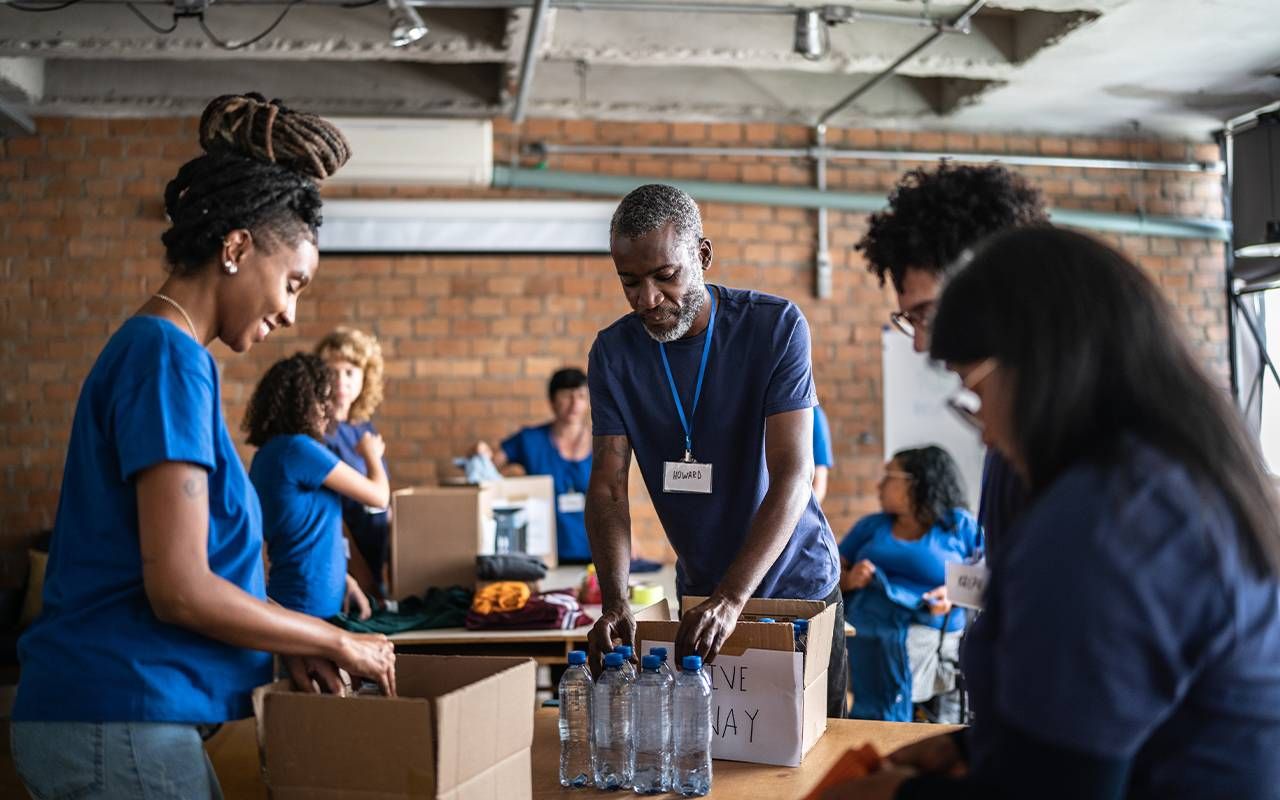Best New Year's Resolutions
Forget pledges to diet and exercise. Committing to help people less fortunate than you can be better for everyone.
Editor’s note: This story was originally published on Next Avenue in December 2022.
You can probably guess the most common New Year's resolutions for 2023. They're the traditional big three pledges we make every year after a month of winter holiday excess: exercise more, eat healthier and lose weight.

Thanks perhaps to the pandemic — or just life in general in a mad, mad, mad world — we can now add "improve mental health" to the list. In fact, a Forbes Health/OnePoll survey of 1,005 U.S. adults conducted November 18 to November 22 revealed that this goal is now the top resolution among all age groups.
But what if I told you that you could reap most of the benefits of those daunting — and too often abandoned — pledges without counting a calorie or joining a gym? And make the world a better place in the process?
'It's Good to Be Good'
You can do this by resolving to help others in lieu of improving yourself. By vowing to volunteer, you can reap a host of physical and mental health benefits.
"Resolving to help others can yield just as many health benefits as the more traditional new year's resolutions."
Stephen G. Post, a professor of preventive medicine and bioethics at Stony Brook University in New York, has spent 35 years studying the benefits of volunteering and is convinced they are significant. "Absolutely, resolving to help others can yield just as many health benefits as the more traditional new year's resolutions," he says.
Evidence is substantial, Post adds. "All told, there are probably 3,000 studies confirming the myriad benefits of helping others, studies that tell us, essentially, that 'it's good to be good.'" In a what-goes-around-comes-around bit of karmic serendipity, those who give of themselves end up getting as much as they give. Or more.
Benefits of Benevolence
Here's a round-up of perks that research suggests we can receive by helping others:
Healthier Hearts. Those who volunteer are less likely to develop hypertension and simply donating money to good causes can lead to lower blood pressure.
Longer Lives. Numerous studies reveal that those who volunteer tend to live longer than those who don't. One study found a 44% reduction in early death among frequent volunteers, making volunteering more effective than exercising four times a week.
Sharper Minds. Research also shows that older adults who volunteer could delay or possibly reverse declines in brain function.
Lower Weights. The physical activity involved in volunteering can help you reduce the risk of weight gain and obesity-related conditions.
More Joy. Extensive research suggests that when you help others your brain releases "feel good" chemicals like serotonin, dopamine, oxytocin and endorphins. This can lead to a euphoric experience called "helper's high."
Less Depression. The release of those "feel good" chemicals also can combat feelings of depression; specific research shows decreased depression levels for people over 65.
Extensive research suggests that when you help others your brain releases "feel good" chemicals like serotonin, dopamine, oxytocin and endorphins.
Reduced Stress. Helping others can also reduce cortisol, the stress hormone that can make you feel overwhelmed or anxious. The American Psychological Association points to myriad physical conditions caused or exacerbated by stress, including chronic pain, respiratory problems, obesity, irritable bowel syndrome and even heart attacks.
Prescription Volunteering
The list goes on. And on. And on: More energy, better sleep, improved immunity, help with chronic pain, decreased loneliness, increased self-esteem and life satisfaction, a greater sense of belonging and an enriched sense of purpose in life.
Wow. Not a bad return for what experts say may require an investment of as little as two hours a week.
The research is so persuasive that the National Health Service in the United Kingdom has begun "prescribing" volunteering for patients. Post, who has been part of this "social prescribing" movement, thinks older Americans — who studies show can benefit most from volunteering — should shoot for three to four hours per week, if possible.
How to Stick to Your Pledge
New Year's resolutions have a well-earned reputation for being forgotten within weeks after the ball drops in Times Square. Studies show that as few as 8% of people making these annual pledges are still keeping them by year's end.
Here's the good news: Your pledge to make helping resolutions for this year are more likely to succeed than those traditional vows. According to the Corporation for National and Community Services, 65% of the people who volunteer at nonprofit agencies are still pitching in to help a year later.
There is abundant advice available to people who tackle any kind of annual pledge. For individuals adopting helping resolutions, there are additional, specific strategies that will assist you in sticking to your pledges.
Experts caution that you're setting yourself up for failure if you aspire to unachievable goals. So, while "solving the homelessness crisis in my city" is an admirable ambition, it shouldn't be on your list of resolutions. Instead consider more realistic possibilities like contributing to a local homeless shelter.
Make sure that your resolutions are specific. Take that contribution to a local homeless shelter mentioned above and refine it: "I'll donate $25 each month to XYZ Shelter."
Don't bite off more than you can chew. While you may fantasize about joining the Peace Corps, if you're just starting out as a good-deed-doer, consider an ad hoc, event-based commitment.
Volunteer-Specific Tips
1. Make It Meaningful. Ensure that the cause you're volunteering for is meaningful to you. Your partner may feel moved to join a group working to improve LGBTQ lives — and you may share the sentiments — but your altruism north star could be eradicating hunger. Go with your gut.
"Don't just go through the motions," admonishes Post. "Be sure your heart is in the right place."
If you need help finding the right nonprofit for you, check out Volunteer Match where you can select the "cause areas" that speak to you—from disaster relief to politics and everything in-between.
2. Have a Compassionate Spirit. Post emphasizes that helping others should be founded upon what he terms "an intention of kindness." He explains that it's not so much about the quantity of your volunteering efforts but the quality. It's about "how much kindness you put into the giving."
"Volunteer attrition occurs when people don't have the opportunity to reflect and form community."
This is one area where your helping resolutions have an advantage over those hit-the-gym and fit-into-those-jeans goals. It's much more empowering to look at your list of do-good goals and be able to tie them to your values of caring for people and the planet versus your aspiration to impress folks at your high school reunion.
3. Max Out 'Helper's High' Benefits. This feel-good benefit of volunteering is a built-in motivator. Acknowledge it. It will help you see your efforts not as deprivation but as rewarding, even exhilarating.
4. Get Support. Studies suggest that connecting with others is important to volunteers — especially if they are retired. Post says that "volunteer attrition occurs when people don't have the opportunity to reflect and form community."
This is true for me. During the pandemic I began making sack lunches for a local charity serving the homeless. At first, I did this alone and delivered them while wearing a mask and respecting social distancing.
A couple of friends joined me in 2022, which has been pivotal in my continuing with this project. We've tripled the number of lunches we make each week and strengthened our friendships. A win-win-win.
Document What You Do
5. Keep a "Helper's Journal." Post is emphatic about this strategy. "It gives the helper an opportunity to reflect on the human, emotional side of their experience," he says.
Post adds that if you already keep a gratitude journal, a practice that he notes also has myriad health benefits, you could add your volunteering thoughts to that.
For the past few years, the world has felt pretty off-balance to me (and many others). Pandemics, wars, mass shootings, homelessness, polarization and more can leave us feeling hopeless.
By resolving to help others, we can, at a minimum, begin to heal that personal disconnect between our own inaction and those in need of compassion.
And be part of making the world a bit less disconnected — and a little kinder.


